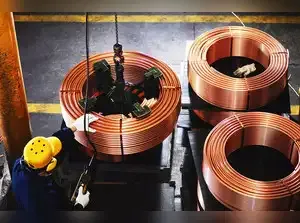Trump’s copper tariff rattles North America, strengthens China’s trade grip
President Donald Trump’s plan to impose a sweeping 50 percent tariff on all copper imports to the United States is sending shockwaves through North American supply chains. But while the goal is to strengthen American industry, experts warn the policy could cripple Canada’s copper exports and hand China a strategic trade advantage.
China exported over $866 million worth of copper to the United States in 2024, according to the United Nations COMTRADE database. Now, with Canadian and Chilean copper suddenly more expensive under the tariff, US manufacturers may be forced to turn to China’s cheaper, state-backed metal, despite ongoing tensions between Washington and Beijing.
Why will Canada be affected?
The hardest blow will land north of the border. Canada is America’s second-largest source of imported copper, and Quebec accounts for the lion’s share of those shipments.
“Regionally, Quebec remains in the crosshairs,” said Robert Kavcic, senior economist at the Bank of Montreal. “That would leave combined metal exports exposed to high tariffs north of 3 percent of GDP, or twice the next closest province.”
Quebec’s economy is deeply tied to copper, with Canada’s only smelter in Rouyn-Noranda and a major refinery in Montreal. Thousands of workers are directly and indirectly linked to the copper trade. Now, many of those jobs could be at risk.
A strategic win for Beijing
Copper is essential to modern industry, from electric vehicles to infrastructure to defense equipment. Raising prices on imports doesn’t eliminate demand, it reroutes it. And right now, the cheapest and most accessible copper may be coming from China.
That means US manufacturers could become more dependent on Chinese suppliers, even as the administration frames the tariff as a national security measure.
Already the world’s largest copper refiner, China is aggressively securing global copper supplies, from Africa to Latin America. This tariff could accelerate that dominance by pricing out allies like Canada and giving Chinese producers a bigger share of the US market.
Trump’s strategy may backfire at home. Copper is widely used in construction, electrical wiring, vehicles, and appliances. A sudden increase in copper prices, already rising since the announcement, will impact not only Canadian exporters but also American manufacturers.
Quebec Premier François Legault has not ruled out provincial support for the industry and is urging the federal government to respond.
The federal government has not yet commented on possible countermeasures.
China exported over $866 million worth of copper to the United States in 2024, according to the United Nations COMTRADE database. Now, with Canadian and Chilean copper suddenly more expensive under the tariff, US manufacturers may be forced to turn to China’s cheaper, state-backed metal, despite ongoing tensions between Washington and Beijing.
Why will Canada be affected?
The hardest blow will land north of the border. Canada is America’s second-largest source of imported copper, and Quebec accounts for the lion’s share of those shipments.
“Regionally, Quebec remains in the crosshairs,” said Robert Kavcic, senior economist at the Bank of Montreal. “That would leave combined metal exports exposed to high tariffs north of 3 percent of GDP, or twice the next closest province.”
Quebec’s economy is deeply tied to copper, with Canada’s only smelter in Rouyn-Noranda and a major refinery in Montreal. Thousands of workers are directly and indirectly linked to the copper trade. Now, many of those jobs could be at risk.
A strategic win for Beijing
Copper is essential to modern industry, from electric vehicles to infrastructure to defense equipment. Raising prices on imports doesn’t eliminate demand, it reroutes it. And right now, the cheapest and most accessible copper may be coming from China.
That means US manufacturers could become more dependent on Chinese suppliers, even as the administration frames the tariff as a national security measure.
Already the world’s largest copper refiner, China is aggressively securing global copper supplies, from Africa to Latin America. This tariff could accelerate that dominance by pricing out allies like Canada and giving Chinese producers a bigger share of the US market.
Trump’s strategy may backfire at home. Copper is widely used in construction, electrical wiring, vehicles, and appliances. A sudden increase in copper prices, already rising since the announcement, will impact not only Canadian exporters but also American manufacturers.
Quebec Premier François Legault has not ruled out provincial support for the industry and is urging the federal government to respond.
The federal government has not yet commented on possible countermeasures.








